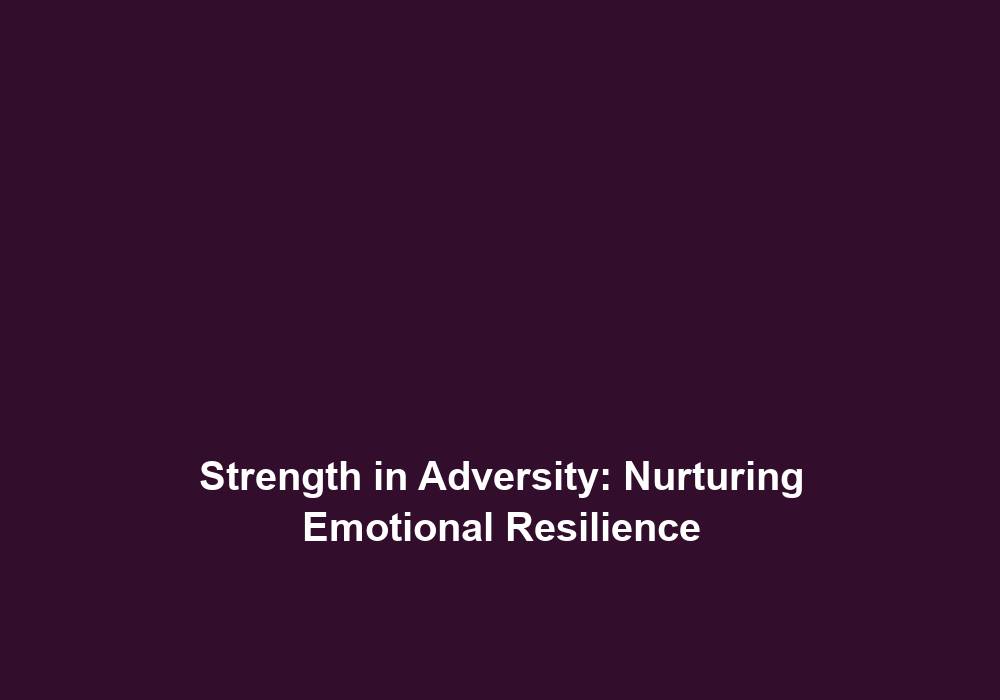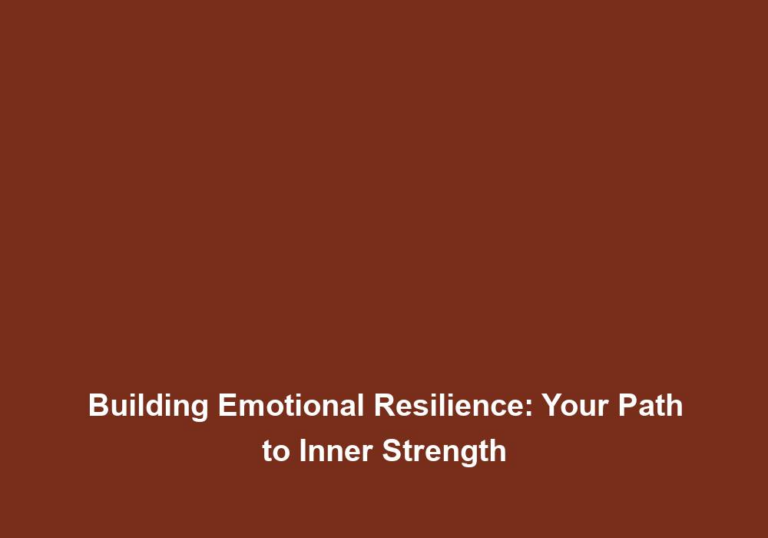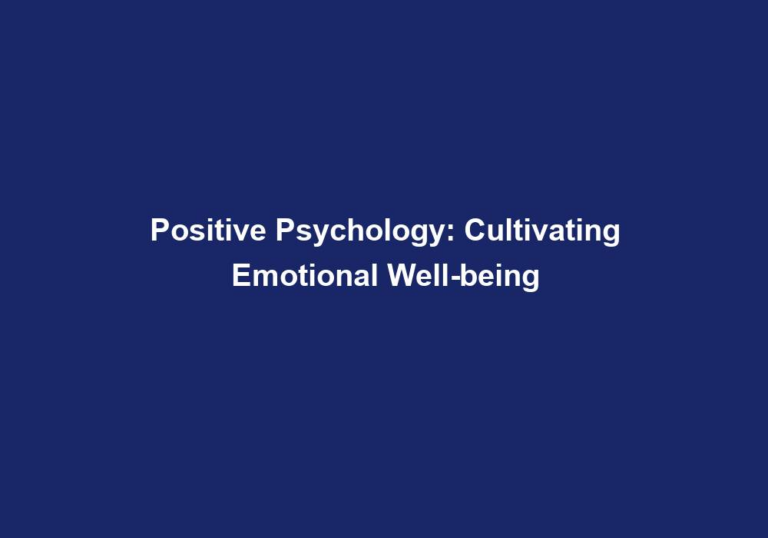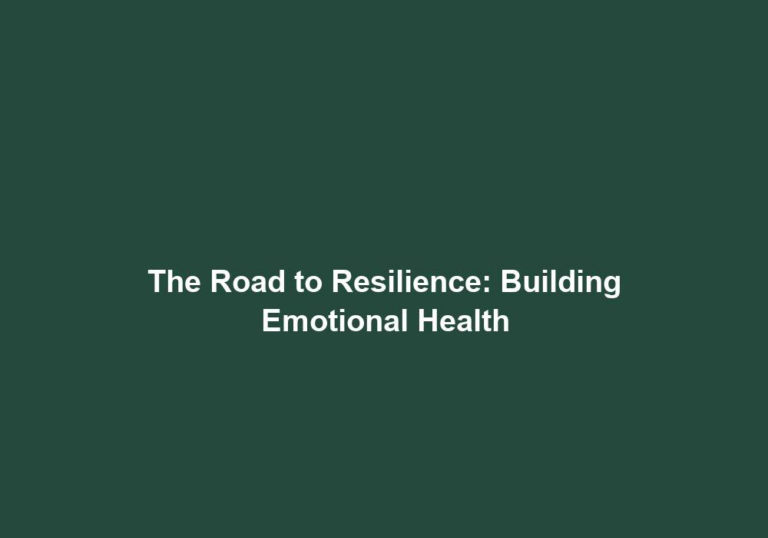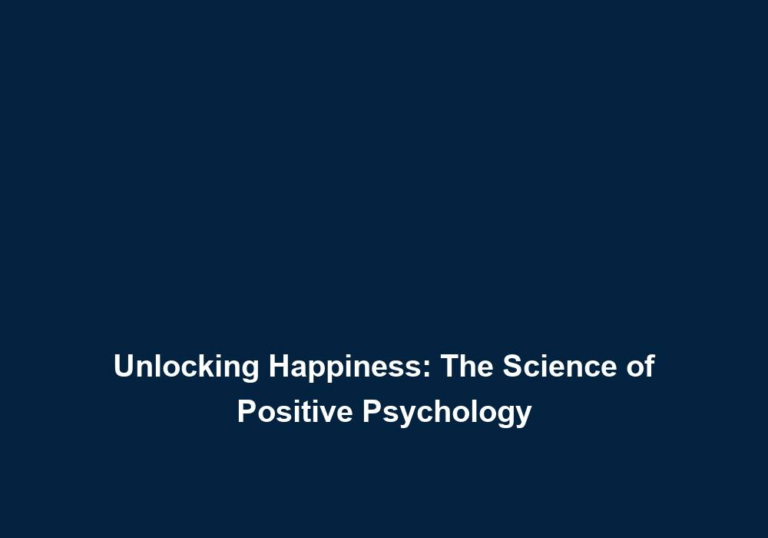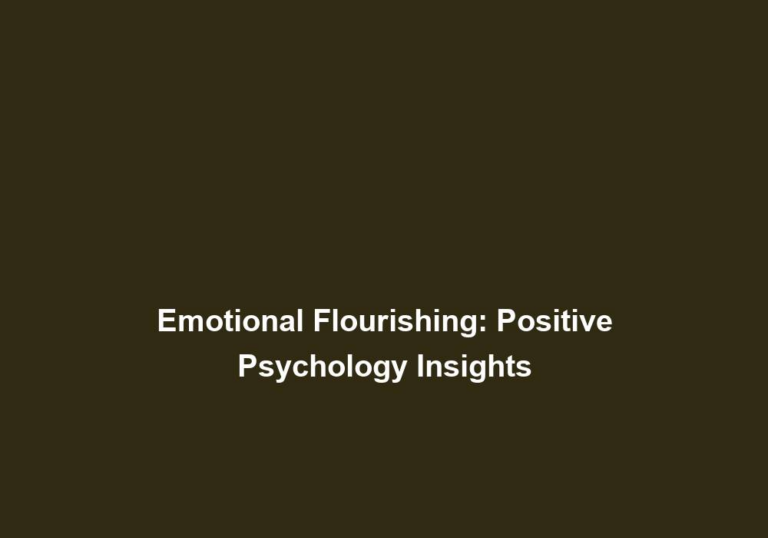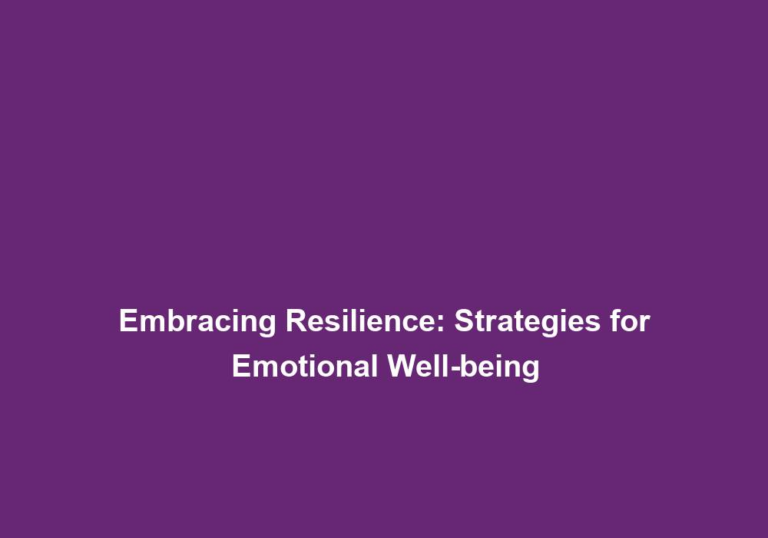Strength in Adversity: Nurturing Emotional Resilience
In today’s fast-paced and unpredictable world, emotional resilience has become a crucial skill for individuals to survive and thrive. Life throws various challenges our way, from personal setbacks to professional obstacles, and our ability to bounce back and adapt in the face of adversity is what sets us apart. Developing and nurturing emotional resilience not only helps us navigate through difficult times but also empowers us to grow stronger from them. In this article, we will explore the significance of emotional resilience and provide practical tips on how to cultivate it effectively.
Understanding Emotional Resilience
Emotional resilience can be defined as the ability to withstand and recover from emotional distress, upheavals, and challenging situations. It involves having a positive mindset, strong self-belief, and the capacity to adapt to change. Resilient individuals are not immune to stress or negative emotions; instead, they possess the skills to handle them effectively and maintain their well-being.
Emotional resilience is a multifaceted concept that encompasses various aspects of our mental and emotional well-being. It involves understanding our own emotions, recognizing triggers that may lead to emotional distress, and having the ability to regulate our emotions in a healthy manner. By developing self-awareness, we can gain insight into our emotional patterns and behaviors, which is a crucial step in cultivating emotional resilience.
Furthermore, emotional resilience is closely linked to our cognitive processes and thought patterns. Resilient individuals have the ability to reframe negative thoughts and focus on solutions rather than problems. They practice gratitude and optimism, celebrating even the smallest victories and acknowledging their personal strengths and achievements. By maintaining a positive mindset, they are better equipped to cope with adversity and bounce back from setbacks.
The Importance of Emotional Resilience
- Coping with Stress: Emotional resilience equips individuals with the tools to manage stress and prevent it from overwhelming them. Resilient people are more likely to stay calm, composed, and focused during stressful situations, enabling them to make better decisions.
In today’s fast-paced world, stress is inevitable. However, how we respond to stress can make a significant difference in our overall well-being. Emotional resilience allows us to cope with stress effectively by utilizing various stress management techniques. These techniques may include deep breathing exercises, mindfulness meditation, or engaging in activities that promote relaxation and stress reduction.
Resilient individuals also have a strong support network that they can rely on during stressful times. This support network may consist of friends, family, or mentors who provide encouragement, guidance, and perspective. Having a support system in place not only helps in managing stress but also provides a sense of belonging and emotional stability.
- Building Mental Health: Nurturing emotional resilience contributes to overall mental well-being. Resilient individuals are more likely to have positive self-esteem, maintain healthy relationships, and effectively manage their emotions, leading to a higher quality of life.
Mental health is a crucial aspect of our overall well-being. Emotional resilience plays a significant role in building and maintaining good mental health. Resilient individuals tend to have a positive self-image and high self-esteem. They value themselves and their abilities, which allows them to face challenges with confidence and optimism.
Additionally, emotional resilience promotes healthy relationships. Resilient individuals possess effective communication skills, empathy, and the ability to understand and manage their own emotions. These qualities contribute to the development of meaningful and supportive relationships, which in turn enhance mental well-being.
- Adapting to Change: In today’s rapidly evolving world, adaptability is key. Emotional resilience helps individuals embrace change, navigate transitions, and seize opportunities presented by new circumstances. Resilient people are more open to learning, growth, and innovation.
Change is an inevitable part of life, and our ability to adapt to it determines our success and fulfillment. Emotional resilience allows us to embrace change and view it as an opportunity for growth and learning. Resilient individuals are open-minded and flexible, which enables them to navigate transitions and seize new opportunities.
Moreover, emotional resilience fosters a mindset of continuous learning and personal growth. Resilient individuals are not afraid to step out of their comfort zones and try new things. They embrace challenges as opportunities to expand their knowledge, skills, and experiences, which ultimately leads to personal and professional growth.
- Enhancing Problem-Solving Skills: Resilient individuals approach challenges as opportunities for growth and learning. They are better equipped to find creative and effective solutions to problems, fostering a sense of empowerment and self-confidence.
Problem-solving skills are essential for navigating through life’s challenges. Resilient individuals possess strong problem-solving abilities and are adept at finding innovative solutions to problems. They approach challenges with a positive mindset, viewing them as opportunities for growth and personal development.
Resilient individuals break down complex problems into smaller, manageable steps. This approach allows them to analyze the situation, identify potential solutions, and make informed decisions. They are not discouraged by setbacks or failures but rather see them as valuable learning experiences that contribute to their problem-solving skills.
- Promoting Physical Health: Numerous studies have shown that emotional resilience positively impacts physical health by reducing the risk of conditions such as cardiovascular diseases, depression, and anxiety. Resilient individuals tend to engage in healthier behaviors and maintain a balanced lifestyle.
The mind and body are interconnected, and our emotional well-being significantly influences our physical health. Emotional resilience plays a crucial role in promoting physical health by reducing the risk of various health conditions. Resilient individuals tend to engage in healthier behaviors such as regular exercise, getting enough sleep, and maintaining a balanced diet.
Furthermore, emotional resilience enables individuals to effectively manage stress, which is a known risk factor for many physical health problems. Resilient individuals are more likely to engage in stress-reducing activities such as mindfulness meditation or engaging in hobbies that bring joy and relaxation. These practices contribute to overall physical well-being and help in maintaining a balanced and healthy lifestyle.
Strategies for Cultivating Emotional Resilience
- Developing Self-Awareness: Self-awareness is the foundation of emotional resilience. Take the time to understand your emotions, triggers, and patterns of behavior. Practice self-reflection, journaling, or mindfulness exercises to enhance your self-awareness.
Self-awareness is an essential component of emotional resilience. By developing self-awareness, we can gain insight into our emotions, thoughts, and behaviors. This awareness allows us to identify our triggers and patterns of behavior that may contribute to emotional distress.
There are various techniques and practices that can help in developing self-awareness. Journaling, for example, allows us to explore our thoughts and emotions in a structured manner. It provides an opportunity for self-reflection and gaining a deeper understanding of ourselves.
Mindfulness exercises, such as meditation or body scanning, can also enhance self-awareness. These practices involve paying attention to the present moment without judgment, allowing us to observe our thoughts, emotions, and bodily sensations objectively.
- Building a Support System: Surround yourself with a strong support network of friends, family, or mentors who can provide encouragement, guidance, and perspective during challenging times. Seek out positive and uplifting relationships that foster growth and resilience.
Having a support system in place is crucial for cultivating emotional resilience. A strong support network consists of individuals who provide emotional support, guidance, and perspective during challenging times. These individuals may include friends, family members, or mentors who have a positive influence on our lives.
When building a support system, it is important to seek out relationships that foster growth and resilience. Surround yourself with individuals who uplift and inspire you, rather than those who bring negativity or discourage your efforts. Positive relationships provide emotional stability, encouragement, and a sense of belonging, which are essential for building and maintaining emotional resilience.
- Maintaining a Positive Mindset: Cultivate a positive outlook by reframing negative thoughts and focusing on solutions rather than problems. Practice gratitude and optimism, celebrating small victories, and acknowledging personal strengths and achievements.
A positive mindset is a powerful tool for cultivating emotional resilience. Resilient individuals practice reframing negative thoughts and focusing on solutions rather than dwelling on problems. They cultivate gratitude and optimism, celebrating even the smallest victories and acknowledging personal strengths and achievements.
One effective way to maintain a positive mindset is through the practice of gratitude. This involves regularly expressing gratitude for the things we have and the positive experiences in our lives. By focusing on the positives, we shift our perspective and develop a more optimistic outlook.
Additionally, resilient individuals celebrate their achievements, no matter how small. By acknowledging personal strengths and accomplishments, they build self-confidence and reinforce a positive self-image. This positive mindset helps in navigating through challenges and bouncing back from setbacks.
- Practicing Self-Care: Prioritize self-care activities that nurture your physical, mental, and emotional well-being. Engage in regular exercise, get enough sleep, eat a balanced diet, and engage in activities that bring you joy and relaxation.
Self-care is an essential aspect of cultivating emotional resilience. It involves prioritizing activities that promote our physical, mental, and emotional well-being. Engaging in self-care practices allows us to recharge, rejuvenate, and build resilience.
Regular exercise is a crucial self-care activity that promotes both physical and mental well-being. Physical activity releases endorphins, which are known as “feel-good” hormones. Exercise also helps in managing stress, improving sleep quality, and boosting overall mood.
Getting enough sleep is another important aspect of self-care. Quality sleep allows our bodies and minds to rest and recharge, which is crucial for maintaining emotional resilience. Establishing a bedtime routine and creating a sleep-friendly environment can contribute to better sleep habits.
Eating a balanced diet is also essential for self-care and promoting emotional resilience. A diet rich in fruits, vegetables, whole grains, and lean proteins provides the necessary nutrients for optimal brain function and emotional well-being.
Engaging in activities that bring joy and relaxation is another important self-care practice. These activities may include hobbies, creative outlets, spending time in nature, or practicing mindfulness. Finding activities that bring you joy and allow you to unwind is essential for nurturing emotional resilience.
- Developing Problem-Solving Skills: Strengthen your problem-solving abilities by breaking down challenges into smaller, manageable steps. Practice decision-making and critical thinking skills to enhance your problem-solving capacity and boost your confidence.
Problem-solving skills are a crucial component of emotional resilience. Resilient individuals approach challenges as opportunities for growth and learning. They possess strong problem-solving abilities and are adept at breaking down complex problems into smaller, manageable steps.
To develop problem-solving skills, it is important to practice decision-making and critical thinking. This involves analyzing the situation, considering various options, and making informed decisions. By honing these skills, we enhance our problem-solving capacity and boost our confidence in facing challenges.
Furthermore, seeking alternative solutions and thinking outside the box contribute to effective problem-solving. Resilient individuals are open to exploring different approaches and are not discouraged by setbacks. They view challenges as opportunities to develop creative and effective solutions, which fosters a sense of empowerment and self-confidence.
- Cultivating Flexibility: Embrace change and uncertainty as opportunities for growth and learning. Develop the ability to adapt to new situations and seek alternative solutions when faced with setbacks or obstacles.
Flexibility is a key aspect of emotional resilience. Resilient individuals embrace change and uncertainty, viewing them as opportunities for growth and learning. They develop the ability to adapt to new situations and seek alternative solutions when faced with setbacks or obstacles.
Cultivating flexibility involves developing a mindset that is open to change and willing to explore new possibilities. Resilient individuals recognize that change is a constant part of life and approach it with curiosity and adaptability. They are not resistant to change but rather embrace it as an opportunity for personal and professional development.
Furthermore, cultivating flexibility requires the ability to let go of rigid expectations and adapt to new circumstances. Resilient individuals are able to adjust their plans and strategies when faced with unexpected challenges. They remain open-minded and seek alternative solutions, which allows them to navigate through adversity with resilience.
- Practicing Emotional Regulation: Learn to manage your emotions effectively by identifying and expressing them in a healthy manner. Practice deep breathing exercises, meditation, or engage in activities that help you relax and find inner peace.
Emotional regulation is a vital skill for cultivating emotional resilience. Resilient individuals have the ability to manage their emotions effectively, which contributes to their overall well-being.
To practice emotional regulation, it is important to develop awareness of our emotions. This involves identifying and acknowledging our feelings without judgment. By recognizing and accepting our emotions, we can effectively manage them and prevent them from overwhelming us.
Deep breathing exercises and meditation are effective techniques for practicing emotional regulation. These practices help in calming the mind and body, reducing stress and anxiety. Engaging in activities that promote relaxation, such as listening to music, practicing yoga, or spending time in nature, also contribute to emotional regulation.
- Embracing Failure as a Learning Opportunity: Instead of fearing failure, view it as a stepping stone towards success. Embrace failure as an opportunity to learn, grow, and develop resilience. Maintain a growth mindset that sees setbacks as valuable experiences.
Failure is an inevitable part of life, and resilient individuals embrace it as a learning opportunity. Rather than fearing failure, they view it as a stepping stone towards success. Resilient individuals maintain a growth mindset, where setbacks and failures are seen as valuable experiences that contribute to personal and professional development.
Embracing failure involves reframing our perspective and focusing on the lessons learned from our mistakes. Resilient individuals analyze the factors that led to failure and identify areas for improvement. They use failure as a motivator to work harder, learn from their mistakes, and develop resilience in the face of adversity.
Additionally, maintaining a growth mindset allows us to approach challenges with optimism and perseverance. Resilient individuals believe in their ability to learn and grow, even in the face of setbacks. They see failure not as a reflection of their worth but as an opportunity to develop new skills and strategies.
- Seeking Professional Help: If you find it challenging to cultivate emotional resilience on your own, don’t hesitate to seek professional help. Therapists, counselors, or coaches can provide guidance, support, and teach specific techniques to enhance your resilience.
Cultivating emotional resilience is a

